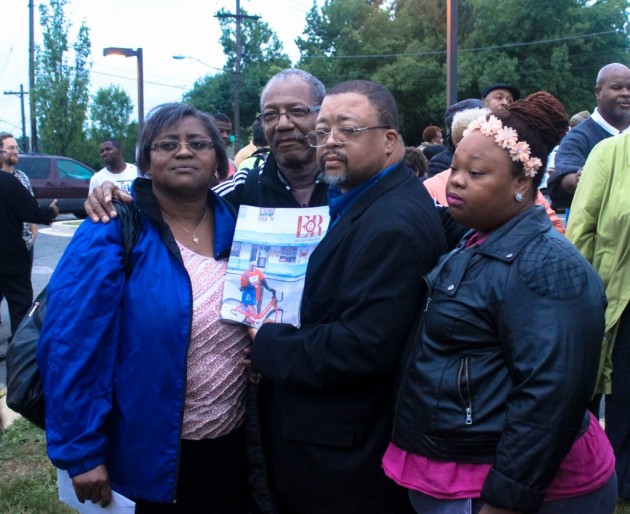WASHINGTON– Being courageous is certainly not an easy task. Being courageous does not simply lend itself to one’s overcoming of his or her personal misgivings. Rather, being courageous manifests itself through the cumbersome tasks of perseverance, strength and education.

Ramona Brant, a panelist cries while sharing her story- photo by Nkechi Nnorom.
On Thursday, Sept. 21, the second day of the 47th Annual Congressional Black Caucus, former MSNBC host Melissa Harris-Perry moderated a panel which focused on the crisis of domestic violence and mass incarceration amongst women of color. The panelists, who have all been affected by either domestic violence or the prison system, were Sabrina Greenlee, Ramona Brant, Jim St. Germain, Marissa Alexander, Rev. Unnia Pettus and Karma Cottman.
The panel was sponsored by Rep. Sheila Jackson Lee, D-Houston. As she arrived to the podium, Lee instantly corralled the packed room, urging the audience to wake up, to stay woke and to advocate for “better deals” for victims of domestic violence and mass incarceration.
“I believe why we’re in this room today to save lives,” said Lee.
Panelist Sabrina Greenlee has echoed Lee’s sentiment of saving lives through her creation of S.M.O.O.T.H. Inc. In 2013, Greenlee founded the non-profit organization to empower women and families through education, mentoring, counseling, motivational speaking and outreach activities.
Eleven years prior, Greenlee was a victim of a murder plot concocted by her then ex-boyfriend. The heinous incident left 17 percent of her body burned, leaving her on life support, needing multiple skin grafts and leaving her totally blind for three years.
“She [Greenlee] was not born blind or in the context that she is here today,” said Lee. “She was born brilliant and beautiful.”
Greenlee’s journey has been a difficult one. At 17, she was abused and hospitalized four times by her boyfriend. By 18, she married him. However, her painful past is what gives her the strength to push through.
“I am a survivor. Not only am I a survivor, I am a thriver,” said Greenlee. “It took 15 years of praying. They didn’t take all of my power because I can still talk.”
The other panelists also spoke about their painful dark pasts. At 25-years-old Pastor Unnia Pettus had just received her master’s from American University. She was making $75,000 and was preparing to marry the love of her life. On her wedding day, her husband, who was also a pastor, began verbally abusing her, calling her fat and her dress ugly. The verbal abuse soon turned psychological and physical. Her ex-husband kicked would kick her with steeled-toed boots, among other things.
The crowd became visibly emotional as she further revealed her marriage troubles, now at 49.
“A year after my divorce, I was diagnosed with colon cancer,” said Pettus. “I’ve had three brain tumors, including one now.”
Additionally, panelists Marissa Alexander and Ramona Brant spoke on how the justice system failed them. Alexander is known for her involvement in Florida’s ‘stand your ground’ case in 2012. Alexander, 36, was sentenced to the mandatory minimum sentence of 20 years in jail for firing a warning shot at her husband, who she said had abused her. The incident came just nine days after the birth of her daughter. Her sentence was later overturned. After serving three years in prison, Alexander was released from prison and finally free on Jan. 27, after serving house arrest.
“I didn’t see my ninth-month old daughter until she was three years old,” said Alexander.
Similarly, Brant received an egregious sentence for a first-time offense. Brant, a mother of two, was sentenced to life in prison after being charged with conspiracy to possess and distribute cocaine in 1995. Prosecutors claimed that she was part of a Charlotte, North Carolina, drug ring by her then boyfriend.
“I felt abused by my children’s father,” said a teary-eyed Brant. “I felt abused by the system. I felt abused by society.”
One in three women have been victims of physical violence by an intimate partner. Moreover, women between 25 and 34 are reportedly the most vulnerable to partner violence. The panelists educated the audience in hopes of lowering these statistics and encouraging women, men and children to be courageous and fight back against abuse and the prison system.



